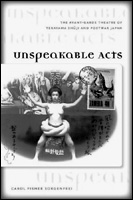Unspeakable Acts: The Avant-Garde Theatre of Terayama Shuji and Postwar Japan
by Tom Mes
The late Shuji Terayama remains one of the most enigmatic figures in the history of Japanese cinema. His films are thick with symbolism, featuring a psychosexual content that can, and has, rubbed many the wrong way. Emperor Tomato Ketchup (Tomato Ketchappu Kotei, 1970), with children taking part in sexually tinted scenes, is but one example. Incest fantasies formed his most recurring motifs.
Terayama was much more than just a filmmaker. A playwright, stage director, poet, essayist, and all-round media personality, his work continues to have a strong following in his homeland, where he remains a phenomenon. On our shares, largely due to a shameful unavailability of any of his work, he has never received his due. As a filmmaker he is often lumped together with the Japanese New Wave, despite his complete lack of filmmaking apprenticeship. His unorthodox approach to theatre has furthermore made him something of a pariah among Western historians of Japanese drama, who, unable to conveniently fit him into any sort of current, seem to have opted to simply disregard him. As Danny Fields once said, it's always easier not to do something.
Carol Sorgenfrei's Unspeakable Acts is the first monograph in the Western world to attempt to unravel the mystery and do Terayama justice. Or at the very least make some sense of the artist's world of symbolism and provocation. The author teaches theatre at UCLA, and the emphasis of the book is largely on Terayama's stage work. The result, however, is more than accessible to those who know Terayama mainly from his films and have little or no knowledge of theatre in general. Sorgenfrei refrains from using jargon, looking at Terayama's work on its own terms, keeping things admirable understandable to layman readers. Any reference to other figures in the world of drama, even such luminaries as Bertolt Brecht or Antonin Artaud, comes with the necessary amount of context for those not familiar with their writings. What's more, Terayama's body of work is so thematically consistent across the full breadth of his activities, that the author's analysis is just as valid for the films as it does for the plays.
Sorgenfrei's approach borders on psychoanalysis at times, something that is unavoidable when looking at a man whose work was so steeped in childhood trauma and featured such a prominent role for the overbearing mother figure. Terayama's life plays as important a part in the book as his art - not an easy task, since his creativity didn't end when it came to rewriting his own life story.
Hugely welcome additions to Unspeakable Acts are the translations of three plays - The Hunchback of Aomori, La Marie-Vison (a.k.a. Mink Marie) and the notorious Heretics, a largely unstructured play whose emphasis on audience involvement led to punch-ups between actors and spectators - plus a selection of Terayama's writings on theatre. It's safe to assume that the objective of a book of this sort, and thus the objective of Sorgenfrei, is to give the reader a better understanding of the subject and thereby more enjoyment of his work. Combining independent analysis with the artist's own writings provides two entry points that can (and here certainly do) complement each other marvelously well. Terayama's mission statement was "To bring about social change through revolutionary imagination", a phrase that at first sight will strike most people as hopelessly abstract and obtuse. In the course of reading Sorgenfrei's book, however, not only do we get to understand what he meant, we are shown quite precisely how he went about achieving his goal.
In short, Sorgenfrei does a commendable job, painting a fascinating portrait of both the artist and the man Terayama, as well as of his times and the cultural climate of the period. Now if only someone would actually make Terayama's work available...
